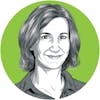 See
more of the story
See
more of the story
For a home-schooled kid from rural Kanabec County, 4-H was a lifeline; a connection to other youth and to the world beyond.
For Jackson Yates, it was the first step toward finding himself, and his place in that world.
"I'm a trans man from rural Minnesota," Yates said. Growing up, "I knew I was uncomfortable, from a very young age, but I didn't really know that trans people existed."
He learned so much from his years in 4-H. How to train a dog, how to exhibit livestock, how to represent Minnesota 4-H at a presidential inauguration. But he was hurting. And he felt very alone.
It would have meant the world to have "a group of people who are there for you, offering unconditional acceptance," he said. "I don't think I would have struggled so much with mental health and trying to figure out, 'Who am I?'"
Yates is now a 4-H extension educator in northern Minnesota and in a position to offer other youngsters the support he missed.
Minnesota 4-H is taking a stand for, and with, LGBTQ+ youth.
Let's Talk About Gender Identity is a five-part online educational series from the University of Minnesota Extension that will run for the next several weeks. It's a chance for 4-H members and LGBTQ alumni to talk about everything from gender and sexual orientation to what to do when a friend uses "gay" as an insult.
If you visit the 4-H building at the Minnesota State Fair, you'll see a sign above the door: 4-H Welcomes You. This program puts that promise into action.
"Queer people have been in 4-H, always, and are in rural spaces, even when people don't think that they are," said Joseph Rand, an Extension educator at the University of Minnesota's Center for Youth Development, who helped develop the program. "4-H is for all kids, so our mission is to make sure that all kids have a space where they can feel that sense of belonging."
The idea for the program came from 4-Hers themselves.
"It's definitely lonely," said Rachel, a queer youth in rural Minnesota. "Hanging out with other teenagers in this area might not be the safest thing."
Rachel and another 4-Her came up with the idea for the program and worked with University of Minnesota Extension educators for more than a year to make it happen. In a world that felt unsafe, they created a space where LGBTQ+ youth could be welcome and where their friends could learn to be good allies.
Rachel's pronouns are she and they. Rachel's last name will not be appearing in this column because if it was safe to do that, 4-H wouldn't need a program like this.
Before the program had even started, Rachel knew what the bullies would say. That 4-H students are too young to learn about their own identities. That they are being indoctrinated.
But this program isn't just about learning. It's about leading.
"4-H is a program that encourages youth leadership, and the youth have chosen to make and support a space where they can feel comfortable," Rachel wrote in an e-mail. "True youth leadership is not conditional. We will continue to make programs that we want to be a part of, regardless of whether they make nonparticipants uncomfortable."
Like every other 4-H project, kids will opt in to the program if it's a topic that's important to them.
"A big part of making our world a better and friendlier place is education," said Victoria Shafer, a 4-H state ambassador who had just finished work on a program called "Let's Talk about Race," when Rachel and others approached her in late 2020 about doing something similar with a focus on LGBTQ+ and gender identity.
Being an ally means standing up and speaking out, and that was something Shafer is more than willing to do.
"LGBTQ students and their safety and their mental health is not a political issue," she said. "They have the human right to feel safe. Stop making youth identity political. Make it so they can feel safe, no matter what political party you are a part of."
Kids come to 4-H from farms and cities and suburbs. They pick a project they like and learn by doing. They raise livestock, or build robots, or grow a garden, or stage a play.
"It's a space for everybody," Yates said. "It's a space to learn."
So if you want a world where every child feels safe, respected, and loved just the way they are — take a lesson from 4-H and learn how to build that world.




